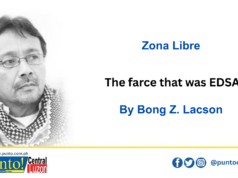CITY OF SAN FERNANDO – The en banc decision of the Commission on Elections (Comelec) on the case ousting Gov. Eddie Panlilio has opened more criticisms that now put into question the credibility of the polls body.
Noting that the case is no longer sub judice, this province’s Parish Pastoral Council for Responsible Voting (PPCRV) finally released its observations on the Comelec’s recount of votes that led to the en banc verdict declaring Lilia Pineda as the purportedly the real winner in the 2007 gubernatorial polls.
Panlilio’s lawyer Ernesto Francisco said the en banc order was “immediately executory” and did not even provide for the usual 30-day period to enable Panlilio enough time to file an appeal to the Supreme Court.
In a text message to Punto, however, Pineda’s lawyer George Garcia said “We will not force the issue. The election is our primary concern. We don’t want to add to the chaos we are now experiencing.”
The PPCRC’s statement was based on the original decision of the Comelec’s Second Division which has been confirmed this by five en banc members of the commission. Only Commissioner Rene Sarmiento dissented in the decision, while Chairman Jose Melo did not participate.
Liberal Party vice gubernatorial candidate Marco Lazatin, at a press conference here, said that the five Comelec commissioners who affirmed the Second Decision’s verdict virtually “arrogated unto themselves the sovereignty of the Kapampangans in the 2007 elections.”
In its statement, the PPCRV said “the resolution of the Second Division of Comelec demonstrates that it is possible to talk about the law—and not apply it when it should be applied.”
It noted alleged inconsistencies in the Comelec division’s resolution on the Panlilio case adversely affecting both the governor and Pineda.
The PPCRV cited the so-called “intention rule which is supposed to give more importance to the intention of the voter than technical irregularities.”
Yet, the Comelec ignored this rule when it refused to count “Among”, “Ed”, “Naynay” and “Baby” in favor of either Panlilio or Pineda despite the clear intention of the voter on who they were voting for, the PPCRV said.
“If the intention of the voter can be seen from the words written on the ballot, then that person’s vote should be recognized by Comelec even if the words do not exactly use the registered name of the particular candidate,” the PPCRV noted.
The PPCRV also noted the failure of the Comelec to resort to election returns in lieu of ballots which were burned in Mabalacat town and damaged in Arayat. “Election returns are the best evidence in the absence of ballots,” it noted.
In an earlier interview, Second Division chairman Nicodemo Ferrer admitted that election returns were not resorted to, even as provincial Comelec chief Temmie Lambino said that election returns were available for reference.
The PPCRV also noted that the Comelec decision “also demonstrates that it is possible to apply one rule in one case and not to apply it in another case, even if the circumstances of both cases are exactly the same.”
It cited instances in which it counted votes for “Among Panlilio” written in the space provided for congressman and junked “Among Ed Panlilio” written in a similar space in another ballot.
The PPCRV also noted inconsistencies between the results of the actual counts done by Comelec committees during the recount process and the figures cited in the Comelec decision. It cited the case of Committee No. 8 which reported 9,012 votes for Panlilio but was reported as 9.008 in the Comelec resolution.
“The point is that accuracy in calculation is supposed to give legitimacy to the findings of these Committees. In these examples however, the errors in calculations makes it open to question,” the PPCRV said.
Noting that the case is no longer sub judice, this province’s Parish Pastoral Council for Responsible Voting (PPCRV) finally released its observations on the Comelec’s recount of votes that led to the en banc verdict declaring Lilia Pineda as the purportedly the real winner in the 2007 gubernatorial polls.
Panlilio’s lawyer Ernesto Francisco said the en banc order was “immediately executory” and did not even provide for the usual 30-day period to enable Panlilio enough time to file an appeal to the Supreme Court.
In a text message to Punto, however, Pineda’s lawyer George Garcia said “We will not force the issue. The election is our primary concern. We don’t want to add to the chaos we are now experiencing.”
The PPCRC’s statement was based on the original decision of the Comelec’s Second Division which has been confirmed this by five en banc members of the commission. Only Commissioner Rene Sarmiento dissented in the decision, while Chairman Jose Melo did not participate.
Liberal Party vice gubernatorial candidate Marco Lazatin, at a press conference here, said that the five Comelec commissioners who affirmed the Second Decision’s verdict virtually “arrogated unto themselves the sovereignty of the Kapampangans in the 2007 elections.”
In its statement, the PPCRV said “the resolution of the Second Division of Comelec demonstrates that it is possible to talk about the law—and not apply it when it should be applied.”
It noted alleged inconsistencies in the Comelec division’s resolution on the Panlilio case adversely affecting both the governor and Pineda.
The PPCRV cited the so-called “intention rule which is supposed to give more importance to the intention of the voter than technical irregularities.”
Yet, the Comelec ignored this rule when it refused to count “Among”, “Ed”, “Naynay” and “Baby” in favor of either Panlilio or Pineda despite the clear intention of the voter on who they were voting for, the PPCRV said.
“If the intention of the voter can be seen from the words written on the ballot, then that person’s vote should be recognized by Comelec even if the words do not exactly use the registered name of the particular candidate,” the PPCRV noted.
The PPCRV also noted the failure of the Comelec to resort to election returns in lieu of ballots which were burned in Mabalacat town and damaged in Arayat. “Election returns are the best evidence in the absence of ballots,” it noted.
In an earlier interview, Second Division chairman Nicodemo Ferrer admitted that election returns were not resorted to, even as provincial Comelec chief Temmie Lambino said that election returns were available for reference.
The PPCRV also noted that the Comelec decision “also demonstrates that it is possible to apply one rule in one case and not to apply it in another case, even if the circumstances of both cases are exactly the same.”
It cited instances in which it counted votes for “Among Panlilio” written in the space provided for congressman and junked “Among Ed Panlilio” written in a similar space in another ballot.
The PPCRV also noted inconsistencies between the results of the actual counts done by Comelec committees during the recount process and the figures cited in the Comelec decision. It cited the case of Committee No. 8 which reported 9,012 votes for Panlilio but was reported as 9.008 in the Comelec resolution.
“The point is that accuracy in calculation is supposed to give legitimacy to the findings of these Committees. In these examples however, the errors in calculations makes it open to question,” the PPCRV said.




